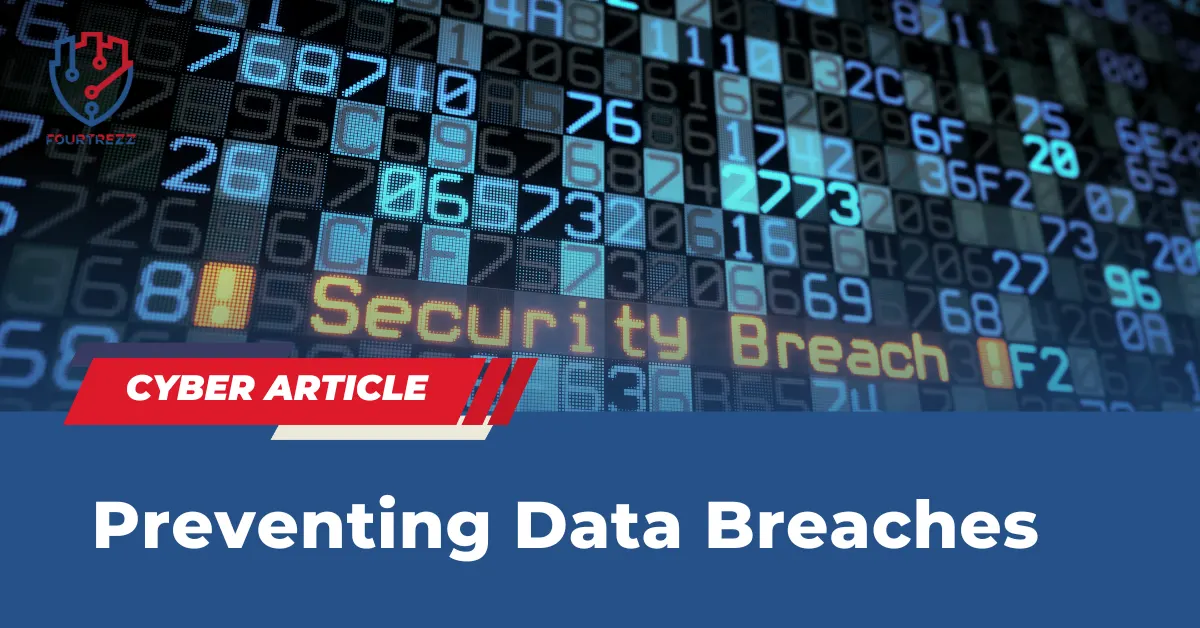Senin, 27 November 2023 | 5 min read | Andhika R
Preventing Data Breaches
Data breaches are a very serious matter and must be vigilantly guarded against by every organization. The security of information and consumers' personal data is the primary responsibility of every company. Currently, many companies have suffered data breaches, resulting in significant financial and reputational losses. Therefore, it is crucial for every company to understand and have the right strategy in place to prevent data breaches.
Fourtrezz, as a cybersecurity company, recognizes the importance of this issue. Therefore, we would like to share some effective tips and strategies to help companies prevent data breaches. We will discuss risk analysis, encryption, and awareness training, all of which are integral parts of an effective way to prevent data breaches.

Understanding Threats
- Types of Data Breaches Data breaches can occur for various reasons, and there are several types of breaches to be aware of. Common types include identity theft, credit card information theft, and medical information theft. These are some of the most common and dangerous types of breaches for any company.
- Common Causes of Data Leaks Common causes of data leaks include weaknesses in security systems, phishing, and internal incidents. Weaknesses in security systems often lead to breaches because companies lack the right solutions to protect their data. Phishing is a technique used by criminals to deceive users and request their personal information. Internal incidents involve company staff unintentionally or intentionally disclosing confidential company information.
- Understanding Attack Targets To understand threats and identify targets, companies must analyze their data and information. They need to determine what attackers are looking for and how they can access this data. After identifying targets, companies can take steps to strengthen their security systems and ensure their data is safe from threats.
Implementing Security Measures
- Employee Training Employee training is one of the most effective ways to prevent data breaches. Employees must know how to protect company data and identify potential threats. Training should also cover how to avoid phishing and how to report any incidents that may occur.
- Strong Passwords Strong passwords are an effective way to ensure company data is secure. Each employee should have a strong, unique password for each account they own. Passwords should also be updated regularly and never shared with anyone.
- Data Encryption Data encryption is the process of converting confidential information into unreadable symbols without the appropriate key. This is one of the effective ways to ensure that company data is secure, even if it is stolen or leaked.
- Access Control Access control is the process of ensuring that only authorized individuals can access company data. This can be done by limiting access to certain systems and applications and ensuring that everyone with access goes through a strict authentication process.
- Regular Software Updates Regular software updates are one of the effective ways to ensure that the company's security system is always up-to-date. Companies should ensure that all software used in their security system is always updated with the latest patches to fix security vulnerabilities.
Best Practices for Data Management
To ensure that your critical data is safe from data breach threats, preventative measures must be taken from the beginning. One of the best things to do is to have a good policy for data management. Here are some suggestions for best practices in data management:
- Data Backup Data backup is one of the best ways to ensure that your data is safe and can be restored after a data leak. You should ensure that your data is regularly backed up in a safe place like cloud storage or other storage media.
- Regular Data Audits Regular data audits are a way to ensure that your data is in good condition and not under threat. You should ensure that data audits are conducted regularly and involve information security professionals to ensure your data is always safe.
- Data Classification Data classification is a way to ensure that your critical data is properly received and stored. Important data like confidential company information should be received and stored in a safer and more protected manner.
- Data Retention Policy A data retention policy is a way to ensure that your data is not stored for too long and that unimportant data is deleted from the system. This also helps ensure that your data does not become a burden to the system and that your critical data remains safe and protected.
By ensuring that you have a good data management policy, you can ensure that your important data is safe and protected from data breach threats.
Conclusion
In this article, we discussed effective ways to Prevent Data Breaches. We started by discussing threats, types of data breaches, and common causes of data leaks. Then, we explained how to implement security measures such as employee training, strong passwords, data encryption, access control, and regular software updates. Finally, we discussed the best practices for data management, such as data backup, regular data audits, data classification, and data retention policy.
Data is a vital asset for every company, and ensuring that it remains secure and protected is the primary responsibility of every data manager. Therefore, it is crucial for every company to take proactive.
Andhika RDigital Marketing at Fourtrezz
Artikel Terpopuler
Tags: Penetration Testing, Keamanan Siber, Manajemen Risiko, Audit IT, Mitigasi Kerentanan
Baca SelengkapnyaBerita Teratas
Berlangganan Newsletter FOURTREZZ
Jadilah yang pertama tahu mengenai artikel baru, produk, event, dan promosi.



